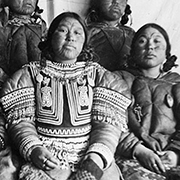CANADA HISTORY
Newfoundland

Newfoundland’s historical development as a colony was shaped largely by its geographic isolation and its reliance on a fish-based economy, which profoundly influenced its social, economic, and political evolution. Unlike other parts of what would become Canada, Newfoundland's economy and society remained heavily dependent on the sea, particularly the cod fisheries, for much of its early history. This limited the colony's capacity for growth and diversification, and by 1830, the population had grown to around 60,000 people, clustered primarily in larger settlements such as St. John’s. However, many smaller fishing outposts dotted the coastline, serving as seasonal or semi-permanent homes for those engaged in the vital but precarious fishing and sealing industries.
The demographic makeup of the island reflected the European origins of its settlers, with the majority being Catholics and Anglicans, alongside a smaller population of Methodists, the latter of whom tended to settle in the more remote outposts. This religious divide played an important role in shaping the social fabric of Newfoundland, particularly as it influenced education, politics, and community organization. Education, for the most part, was rudimentary, particularly in the outlying areas, with more formal schooling often reserved for the children of the growing merchant class in St. John’s. This emerging class, concentrated in the capital, was composed largely of merchants and businesspeople who benefitted from the colony’s export-driven economy and developed distinct social and economic influence within the island.
Newfoundland's growth lagged behind other British colonies, particularly those on the mainland, for several reasons. The island's economy remained heavily dependent on fisheries and sealing, industries which, while lucrative for a few, offered little in the way of long-term growth or diversification. Furthermore, the colony's isolation from the major trade routes and lack of significant natural resources, such as timber or arable land, limited opportunities for expansion into other sectors, such as agriculture or manufacturing. As a result, Newfoundland was slow to develop the kinds of infrastructure and economic foundations seen in other colonies like Upper and Lower Canada or Nova Scotia, where trade, farming, and industry fueled population growth and settlement.
The colony's political evolution was similarly delayed. While responsible government was a defining moment for many British North American colonies in the mid-19th century, Newfoundland lagged behind in this regard as well. In the other colonies, responsible government had become a reality by the 1840s, as demands for greater local control over political affairs grew louder and the British government gradually ceded power to elected assemblies. However, Newfoundland’s unique economic and social challenges made the push for responsible government less urgent. The merchant class in St. John’s, which held considerable sway over local politics and trade, was largely content with the status quo, and there was less political agitation for reform compared to other regions. Additionally, the dispersed population and the isolation of the smaller fishing outposts meant that the colony lacked the kind of unified political voice needed to push for self-governance.
It was not until 1855 that Newfoundland finally achieved responsible government, and even then, it was largely seen as the colony playing "catch-up" with the rest of British North America. The introduction of responsible government did mark a significant milestone for Newfoundland, as it provided the colony with greater control over its own political affairs, including the management of local resources and industries. However, the delay in adopting this system of government reflects the broader challenges Newfoundland faced as it sought to modernize and integrate into the political frameworks of the British Empire.
The political changes of 1855 came at a time when other colonies were beginning to contemplate larger issues of confederation and unity. Newfoundland, however, remained somewhat detached from these discussions, focusing instead on managing its local affairs and dealing with the persistent economic difficulties of a fish-based economy. The colony's reticence to join the broader Canadian Confederation, which came to fruition in 1867, further highlights its distinctive trajectory within the history of British North America. Whereas other colonies, such as Nova Scotia and New Brunswick, were eager to unite with the provinces of Canada for economic and security reasons, Newfoundland opted to remain a separate colony, preferring to maintain its control over its limited but vital fishing industries.
Newfoundland’s eventual path to joining Canada would be a long and contentious one, not occurring until 1949—nearly a century after responsible government was achieved. This delay was due in large part to the colony's persistent economic struggles, which were exacerbated by the global depression of the 1930s and the devastating effects of the First World War. During the interwar years, Newfoundland's economic situation became so dire that it voluntarily relinquished its responsible government and returned to direct British rule in 1934, a rare and striking reversal in colonial history.
In many ways, Newfoundland’s history as a colony and later as a province illustrates the complexities of nation-building in Canada. While responsible government in 1855 was a significant achievement, the colony’s slow economic development and political isolation kept it on the periphery of Canadian Confederation for nearly another century. Yet, Newfoundland's fish-based economy and its maritime traditions also contributed to the unique character of the province and its people, who remained deeply connected to the sea and the rugged landscape of the island.
Today, Newfoundland’s historical trajectory serves as a reminder of the diverse paths that the various regions of Canada followed in their development. The colony’s delayed entry into Confederation, the persistence of its traditional industries, and its unique cultural identity all reflect the distinct challenges Newfoundland faced as it sought to find its place within the broader framework of Canadian history. The granting of responsible government in 1855, though delayed, was a critical step in Newfoundland’s political maturation and laid the groundwork for its eventual integration into Canada, cementing its place as an important yet distinct part of the nation.
Cite Article : www.canadahistory.com/sections/documents




